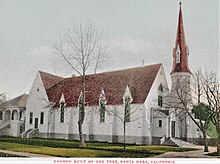Church of One Tree

The Church of One Tree is a historic building in the city of Santa Rosa, California, United States. It was built in 1873/4[1][2] from a single redwood tree milled in Guerneville, California.
Guerneville was the site of an ancient coastal redwood forest, much of which was logged for the rebuilding of San Francisco after the 1906 earthquake and fire. Prior to being renamed for one of the local milling families, Guerneville was called Stumptown for the giant redwood stumps left by the loggers.
The tree used to construct the church stood 275 feet (84 m) high and was 18 feet (5.5 m) in diameter. The single tree, when milled, produced 78,000 board feet (180 m3) of lumber, with the lumber costing a total of $3,000.[3][4] The church was the original home of the First Baptist Church of Santa Rosa, located in downtown on B Street.[5] It was moved to its current location to avoid destruction.[6]
In recent decades, the building has been used for several other unique purposes. Robert Ripley, a native of Santa Rosa, wrote about the Church of One Tree – where his mother attended services – in one of his earliest installments of “Believe It or Not!” In 1970, the Church of One Tree was repurposed as the Ripley Memorial Museum which was stocked with curiosities and “Believe it or Not!” memorabilia for nearly two decades.[7][8] From the 1950s until 1998 it was the Ripley Memorial Museum.[9][10] Starting in 2008 and continuing through 2009, the City of Santa Rosa utilized grant funding to re-lead the stained glass windows, as well as repair, paint and renovate the interior of the church, and the Recreation and Parks Department rents out the space for events. It is located adjacent to Juilliard Park[11] and less than one block from the Luther Burbank Home and Gardens historic site.[3][12]
References
[edit]- ^ Paul T. Hellmann (2006). Historical Gazetteer of the United States. Routledge. pp. 118–. ISBN 1-135-94859-3.
- ^ Sandra Gurvis (1994). The cockroach hall of fame: and 101 other off-the-wall museums. Carol Pub. Group. ISBN 978-0-8065-1501-4.
- ^ a b Scott, Sam (February 22, 2011). "One church, one tree, third incarnation". Santa Rosa Press Democrat. Archived from the original on September 1, 2014. Retrieved February 1, 2021.[dead link]
- ^ Sonoma County Library Heritage Archives
- ^ Bob Voliva (1999). Santa Rosa. Arcadia Publishing. pp. 73–. ISBN 978-1-4396-2711-2.
- ^ ""Raising the steeple of Church of One Tree at its Juilliard Park (Santa Rosa, California) location"". Archived from the original on 2014-12-31. Retrieved 2013-03-24.
- ^ "SR's one-tree icon gets new life, thanks to patience, hard work". Santa Rosa Press Democrat, Feb 24, 2011 Archived December 31, 2014, at the Wayback Machine
- ^ Stephen Metzger (2005). Day Trips® from Sacramento, 2nd. Globe Pequot. pp. 156–. ISBN 978-0-7627-5208-9.
- ^ Rec & Parks. "Church of One Tree Grand Opening". Ci.santa-rosa.ca.us. Archived from the original on 2012-06-08. Retrieved 2013-04-01.
- ^ Jean Doppenberg (2005). Insiders' Guide to California's Wine Country. Globe Pequot Press. pp. 346–. ISBN 978-0-7627-3688-1.[dead link]
- ^ Don Edwards (1986). Making the Most of Sonoma County: A California Guide. Valley of the Moon Press. ISBN 978-0-9615030-0-0.
- ^ Shirley Carter (1986). The First Baptist Church of Santa Rosa: The Church of One Tree.
